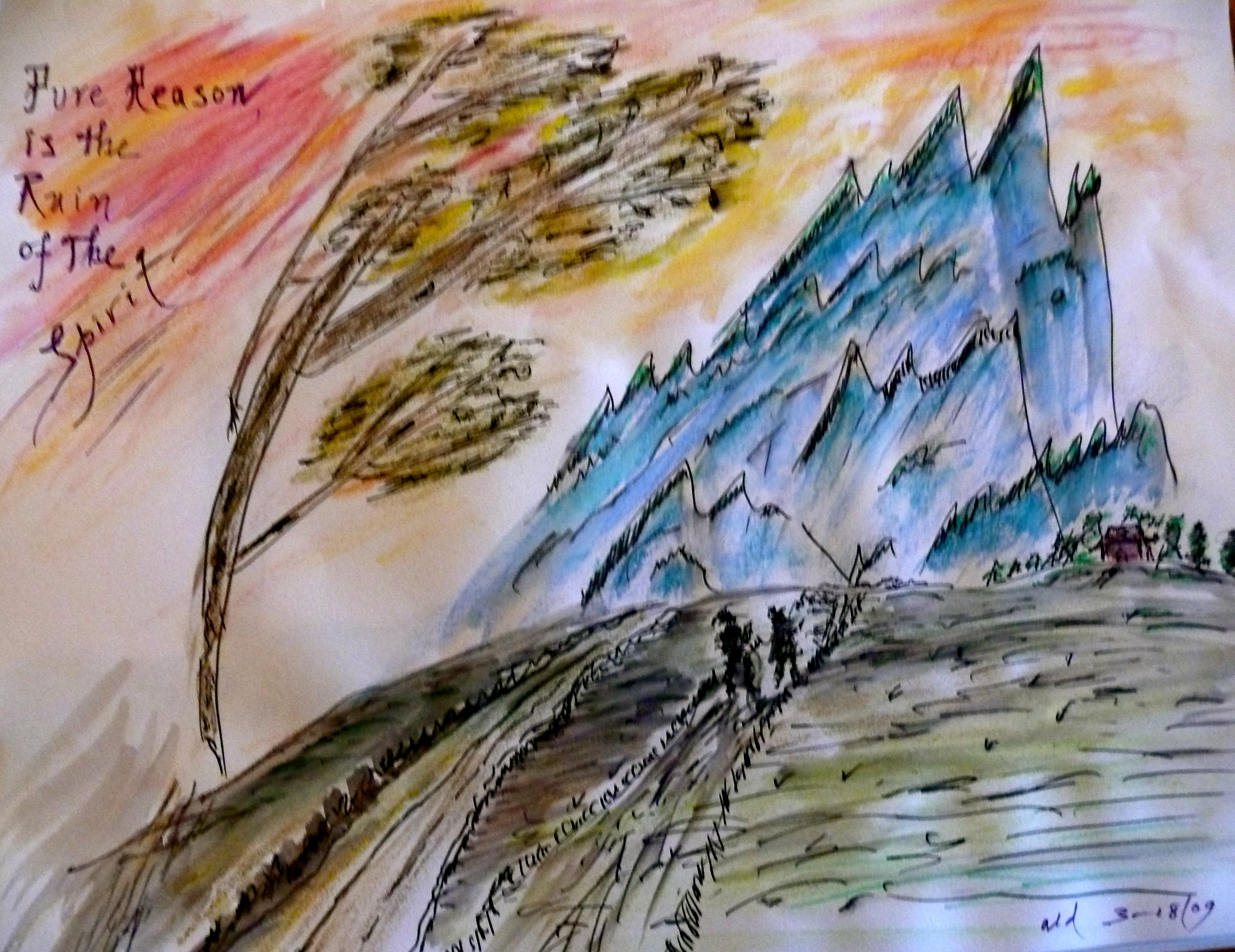If we are overeager, overexcited, and with good reason, we may make such zestful vitalities useful to ourselves and to the world. At times a man may be hurled into great and magnificent happiness. The tender soul inspired, thrills to the status of wondrous comprehension, and the pathway one is ushered down ever encourages further vivid expectation with each advancement, each progressive finding. We learn to be inspired with the breath of joy and the breath of gladness, and in the respiratory context we shall suckle the palaver of our soul with each dilation.
Breathing, our breathing, is afforded us because of that principle which maintains the organically inclined - namely, philo-stratus. [From the Latin ‘stratus’, past participle of sternere: to stretch, extend.] The breathing has a 'mind' and it is of the one mind. All that breathes are together in this the breathing; and the 'mind' becomes the very 'pneuma' of divine breath. HE breathes that we breathe.
In the terrain of the spirit it is imagined that there is no breath, because the cessation hereof is the very signature of physical death. And quite rightly, even though the principle is carried over, the organic action, be it in tree or man, does cease usefulness in that particular way. Having said that, it may also be explained that the entire starry frontier expands and contracts, committed to a rhythm which pulses and heaves steadily breathing. (There is also an equivalent to olfaction & fragrance.)
Our beings breathe- just as not only may we inhale and exhale pulmonarily, by the lungs, but we do also inhale and expire via the organ of the skin. Our totality comprises the breath also of fluids: the primal inborn reflex of expansion and contraction and the 'taking up' of such nourishment as brought in, circulated and later expelled.
Quite rightly! Our intentions, narrowed, fixed and focused and then relaxed, are the veritable breathing of the will and intellect or will and desire.
- We may submit or we may stand fast.
- We may cry happily or cry with sorrow.
- We may know with surety or know that we doubt.
- We may pursue activity or welcome rest.
- We may give over to the Divine Will or we may will divinely, in active passion.
- We may adhere to foreknowledge or we may defy the dictates of an otherwise-fate.
- We may make choice or deliberate.
- We may give counsel or take counsel.
- We may be satisfied or be ill-satisfied.
- We may give graciously or may receive graciously.
This too is breathing, and both need be exercised for a wholesome comprehension of the world. As with the physical conjunction it becomes imperative that relay continues from one to the other. It is not a matter of aspects and opposites; it is the qualifying usefulness, only received by the equal ability of the 'letting go' of the previous.
For example: we may be satisfied or we may be ill-satisfied. This remark may hold good for almost any application. It is an essential statement. Proceed ...we are satisfied. Now if one were to always be satisfied or always be ill-satisfied it would be to no advantage. The opposing factor here does, of course, complement one another - i.e. we know satisfaction because of those periods in which we have known dissatisfaction and vice versa.
However, further than that, I may become satisfied, and the experience which has provoked me to this stimulation is received by me and taken to me. Now I may not come to differing experience of satisfaction until I have totally, completely refused the current one - until it is expelled and I have taken into myself deeply the 'grains that remained' and passed the rest. Only then in the passing, in the ensuing dissatisfaction, may I come to know a different satisfaction, which after being incorporated shall become intrinsic to my being.
The truly peaceful man shall know also his attitude to pain and may make terms with both. We must surely endeavor to be strengthened in all times, in all phases of experience, and astute enough to recognize the gentle motion of 'breathing' and our own variations.
Everything bleeds emanations which are inspired by those closest in locality. Further to this, we may attract to ourselves inhalations, inspirations from such other emanations as we do call upon in heart or mind.
Yes again, one may view the heart and the mind in this context. It is not a question of balance however, as specified before, emotions injected (higher or lower) do not, comprehensively weigh against the divinations of the intellect (higher or lower). And in connection to the heart and its mind, it does always correspond with the track which leads up and into the soul, the spirit - that piece of God which is mindful also - and the associated hierarchies who have designated all preferred good and named it so. The phrase 'listen to your heart' is so because the true speak of one's heart is inarguable - always true and correct - for it contains sympathetic links to all that is, really is.
The true meaning of illusion, as in Maya - as in 'transitory and changeable' etc. - is that it is deceptive. It pretends to be a reinforced reality, when it has only a modicum of real 'grit and grain'. Again, with the principle of breathing we can understand the usefulness of those realities as played out in time which are not as divine realities: they enable the absorption of the divine realities by the experience thereof.
The transitory, in the epics of old, were as the undecided fates cast out of High Heaven, because of an immaturity, because they were compelled to err. When the 'err' is shorn from the fates, and realities of men and brute, then the prize of perfection is gleaned and won forever. Yet one would expect some other motivation to yet follow to make way for new progressive steps, in ceaseless variety. Or at least, that's what we are led to expect!
The complement to 'adopting all men' is to actually become at the same time, refined in one's own sense of individual determination. It is not that the ego of a man must inhale the pneuma of all men and then cast them out in order to know them again. Rather, that he becomes more self-evident to his own self; and in many ways certainties and sureties will follow.
We are not required to relinquish our will to anyone or anything, but that we prefer to exercise our strengths from our ego in those ways which flow only along with the current of the heart; which also as pointed to, coincides with all hearts concurrently. The inner language may be experienced from one unfurling heart to another. When I go to a man, meet with a bird, sit with a tree, we really may appeal to the inner nature, the great reality, and converse upon that within that exchange. However it requires a certain peacefulness to achieve this - without aggravation, for aggravation invites the external realities to overfill the senses. The refuge of the heart does not invite into it impure extrapolations. How could it make room for anything that brings death to the spirit?
Once again, we may become intimate spiritually within the world, in splendid rapport. But also too, we are to have worldly talents which enable us to move about and amongst people in worldly terms, making static, neither nor.
During prayer we release our burdens, whether for ourselves or on behalf of our brothers, and submit the conflicts into the care and domain of higher authority. Although this is by no means the only consequence of prayer, it is one that such issue provides 'space' for that which we are calling for.
Upon the breathing principle, we cannot become stationary in relation to the exercise- we may exert our willfulness and then give over to the meaningful prayer, aligning our 'willingness' with the will as experienced by the ego-divinity of the heart. By this is referenced the 'higher-self' and the 'master' we may call upon for knowledge of the heart - though not to be phrased in words as this is - for the imperfect word is the vehicle for an expired thought, cherished and used by imperfect men. The Higher Self does more of a mime - supposing you could call it that.
Another example:-
- Severity of tension, i.e. questing for perfection (inhalation)
- Relaxation of exacting severity - recreation, time-out to project out from self and into ... (exhalation)
We simply cannot contain and contain, and keep to ourselves those things we harbor indefinitely and amass more. Spiritual 'bloat' is derived from the driving intentions focusing purely upon self at the exclusion of becoming 'heart-conversant' or 'soul-conversant' with corresponding empathies.
When the inhalation of the forces of the Sun are giving over to the expiry of another day, we may contrast this evening with the next, as the tranquil night extends into the parcels of the calendar, reminding us to take nothing for granted, even darkness; for it is only by the invasion of darkness, the permeation of darkness and the surrender of darkness, that our Sun does dominate and prevail at will.


















